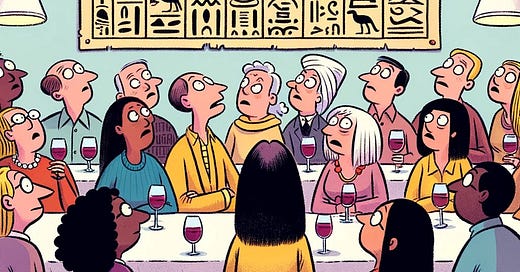NAPA VALLEY, Calif. — In Napa Valley, an incident as seemingly trivial as a waiter’s mispronunciation of a wine’s name is actually indicative of a pervasive issue in the American hospitality industry. This problem is especially evident in a country such as the United States, where wine culture isn’t as deeply embedded as the preference for cola, coffee and beer. Despite being a cornerstone of the dining experience, wine often falls prey to widespread misinformation and ignorance among service staff.
This issue is far from rare. Time and again I’ve witnessed waiters provide misleading or incorrect information about wines in their attempts to assist diners. Such inaccuracies lead to confusion among those new to wine and can provoke frustration in knowledgeable enthusiasts.
The examples are as numerous as they are concerning. A waiter once misidentified Barolo, attributing it to a Barolo grape instead of nebbiolo. Another server mistakenly asserted that rieslings don’t age well. In another instance, a retail clerk incorrectly included Alexander Valley as part of Napa. These cases illustrate the troubling spread of misinformation.
A major factor behind this trend is the high turnover rate of staff. In the United States, restaurant owners often find themselves in a conundrum: They invest in wine education for their staff, only to have them leave for other opportunities. This is in stark contrast to places like London, where being a wine server is a respected and well-compensated profession rather than a transient role.
This revolving door of servers stymies the growth of a robust wine culture. However, when knowledgeable servers and retail clerks are present, they can significantly elevate the wine experience, translating to improved customer satisfaction and increased profits.
Training offered by wholesale wine companies often reaches only the most devoted staff who already understand the nuances between wines like Pomerol and Pommard. However, these training programs frequently neglect the crucial aspect of proper pronunciation, contributing to the “dumbing down” of wine offerings in this country. This results in simpler, more pronounceable varieties such as chardonnay and cabernet sauvignon becoming more prevalent, while unique and adventurous wines are relegated to the confines of winery tasting rooms, rarely making their way into mainstream retail or dining venues.
This trend of simplifying wine offerings fails to address the needs of consumers seeking diverse and unconventional options. The ABC (Anything But Chardonnay/Cabernet) movement is a testament to this thirst for variety. In response, wineries are producing singular varietals such as gruner veltliner and tannat, yet their availability is often limited to tasting rooms and not broadly accessible.
Reflecting on my time teaching a wine-service course at San Francisco State University, I recall a student with great potential who was confronted with the harsh reality of inadequate wine knowledge in his workplace. This scenario is all too common where servers, ideally the conduit between diners and an array of wines, are ill-equipped with the necessary information about the beverages they present.
The problem is not just a matter of limited wine selections. Even in situations where a wide variety of wines is available, the staff’s lack of knowledge and poor pronunciation frequently impede customers’ access to and understanding of diverse wine options. More often than not, it’s not a shortage of choices but a deficit in knowledgeable guidance that limits customers’ exploration of the wine world. Addressing this gap in wine education among service staff is critical to enhancing the customer experience and bolstering sales in both the restaurant and retail sectors.
If today's story captured your interest, explore these related articles:
Dan Berger has been writing about wine since 1975.







I would suggest that the lack of any consistent training program at most restaurants is at least as much to blame for this issue. While turnover is real, most restaurants do not have a comprehensive training program for their staff. They prefer to hire new staff "with experience" and then throw them into the fire.
Well, if there ever was a tempest in a teapot issue, fretting over if a wine server knew the difference between a "barolo" grape from a "nebbiolo" one makes the top of my list. With everything going on right now, having read this article is five minutes of irreversible time that will remain forever never irretrievable.